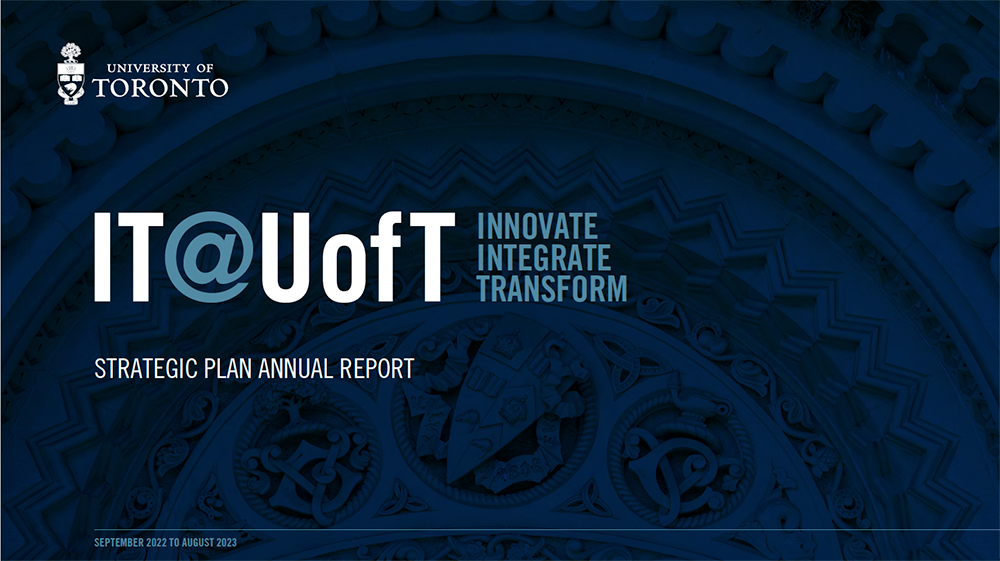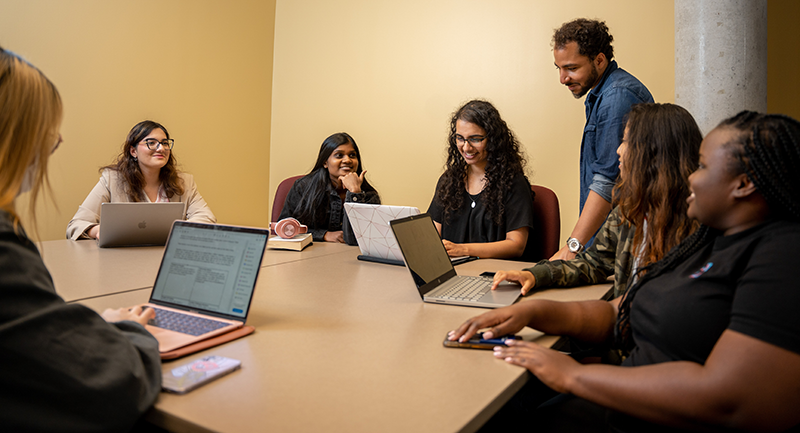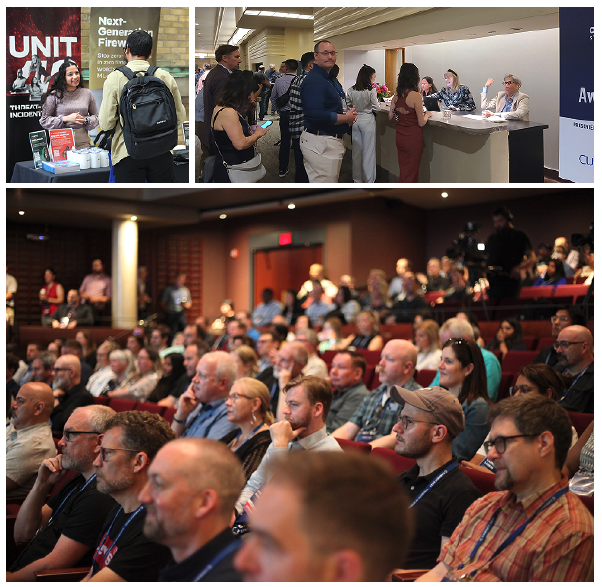

Highlights from the past year
September 2022 to August 2023
Secure Together
Multi-factor authentication (MFA)
In our continued efforts to bolster cyber security, we successfully enabled MFA for nearly 100 per cent of the University community. This crucial step represents our commitment to protecting user accounts from unauthorized access.

Endpoint protection
In partnership with University of Toronto Mississauga (UTM), next-generation anti-virus was successfully deployed to over 2,000 endpoints, paving the way for adoption of the capability by the rest of the University. The institutional rollout of next-generation endpoint protection, co-led by ITS Information Security and UTM, has garnered support from multiple units across the tri-campus community. The Faculty of Arts and Science (FAS), University of Toronto Scarborough (UTSC), Kinesiology and Physical Education (KPE), Leslie Dan Faculty of Pharmacy, Temerty Faculty of Medicine and the Faculty of Music are involved in the pilot with additional units engaged to participate in phase two of the rollout.
Modernizing data access
KPE partnered with the ITS Information Security team to enhance access controls for various systems (both enterprise and local level) via the UTORGrouper service. This initiative ensures more robust data protection and improved accessibility.
Security awareness
In our commitment to building a security-conscious culture, we have established tools and processes to provide baseline security essentials training. During the first phase of the Security Awareness and Training Program (SATP), we successfully onboarded users from 11 participating units. This program will continue to expand, benefitting staff, librarians and faculty across the University.
John Stewart
Information Security Program Manager, UTSC
website saw
141,004
page views over the
past year.
Vulnerability management
We have significantly expanded our scanning capabilities and improved reporting on vulnerabilities. This proactive approach is essential in identifying and mitigating potential security risks promptly.
Private Cloud security
To enhance the security of our systems, we introduced Ubuntu Pro for virtual machines, offering enhanced security features such as live kernel patching, extended security updates, performance optimization and streamlined management for Ubuntu Linux systems. Additionally, we rolled out secure by default virtual machines, delivering pre-hardened virtual instances to partners while sharing Enterprise Information Solutions (EIS) security best practices with the broader user community. Plans are underway to expand this offering to additional licensed compute clusters within the ITS Private Cloud.
New IT governance launch
New oversight model
This year marked the launch of a new governance model, establishing two senior committees, the IT@UofT Board and the IT@UofT Business Board. These boards will provide an institution-wide perspective on priorities and decision-making, encompassing investments, service delivery, policies and practices. A third board, the IT@UofT Service Management Board, will be established following an IT services review. These advisory bodies serve as crucial sounding boards and reference points for the Chief Information Officer (CIO) to prioritize initiatives and address issues.

Network and system enhancements
Tri-campus wireless upgrades
A significant improvement in wireless technology was achieved with the rollout of new Wi-Fi 6 technology, enhancing wireless coverage and increasing network throughput. So far, over 5,600 new Aruba wireless access points (WAPs) have been deployed, representing just over half of the total number of WAPs across the three campuses.
Microsoft Teams Phone migration
Communicator 7 users were successfully transitioned to Microsoft Teams Phone, porting over 4,800 unique accounts by the end of August. We are currently in the advanced features proof-of-concept testing phase. This migration streamlines our Voice Over Internet Protocol (VoIP) communication services.

Network infrastructure upgrades
In pursuit of enhanced performance, secure campus-wide distribution routers, faster switches and higher bandwidth fiber optics communications were deployed. These upgrades significantly improve network throughput and capacity.
Azure landing zones
In partnership with Microsoft, the architecture, design and service delivery model for Azure landing zones was developed. This initiative empowers divisions to leverage cloud-based technologies for local operations. By providing best practice architecture, design and delivery models, we are enabling the University IT community to build and operate an enterprise-scale cloud environment securely and successfully.
Supporting teaching and learning
Student advising
A Salesforce Customer Relationship Management tool for FAS and KPE registrars has been implemented as the foundation for a Student Advising Service (SAS) that will provide consistent, transparent, timely and comprehensive guidance. Collaboration across and between divisional advising units is also enhanced. Work is now beginning on the student portal aspect of the project.
Flexible learning
This program engages instructor teams in the collaborative exploration of effective approaches to digital learning while redesigning courses. The Flexible Learning Initiative, funded by the Vice-Provost, Innovations in Undergraduate Education (VPIUE), aims to build on lessons learned during our shift to remote/online teaching and learning in response to COVID-19.

Lisa Feng
Faculty Registrar & Director, Academic Services, FAS
increased by
40%
increased with
45%
Quercus analytic data
A peer network was established to support the extraction and interpretation of Quercus analytic data. The Data-Driven Design: Quercus Analytics initiative, also funded by the VPIUE, assists instructors in planning course design elements informed by available data, presented as advanced and more detailed visualizations of learner activity.
Increased adoption of Academic Toolbox tools
Specialized applications extend the functionality of the University of Toronto’s Academic Toolbox and research support.
Streamlined administration
Managed systems lifecycle support
A process innovation using ServiceNow for EIS-managed systems and Azure Landing Zone support has been introduced to improve efficiency while enhancing customer experience throughout the full lifecycle of service workflow. Benefits include improved quality of services, decision-making processes and staff productivity, increased transparency and enhanced customer satisfaction. A consolidated monthly billing model for EIS services has been introduced to improve efficiency for divisional administrators.
Azure monthly billing integration with FIS
A new SAP module, Financial Posting Gateway, was implemented to automate the retrieval of billing data directly from Azure. This automation eliminates significant manual effort, providing monthly billing and detailed subscription charge breakdowns for Azure clients, increasing transparency and convenience.

Evolution of O365 product sets
The evolution of our O365 product sets continued as we leveraged new applications such as the Power Apps suite of tools. We successfully migrated users from legacy platforms to the SharePoint Stream video service and facilitated the sunsetting of Yammer as users moved to Microsoft Teams platform for synchronous communication.
Rocket Shuttle to Power BI migration
Approximately 260 divisional users were transitioned from Rocket Shuttle, an aging reporting application for ROSI, to new reporting tools on the modern Microsoft Power BI platform. This supports staff access to advanced data analysis and visualizations.
Services and solutions: Continuous improvement
Financial modernization
More than 550 vendors were moved to an electronic funds transfer workflow, resulting in more timely vendor payments. Additionally, we established requirements for procurement of a new travel and expense application for University community members, further streamlining financial processes.
Human Resources Information Systems (HRIS) modernization
Phase 1 of the Employee Central project was completed, establishing a foundational HRIS operating model and identifying key business processes. We also conducted a review of our enterprise human resource timekeeping requirements, anticipating the Kronos end-of-life product deadline in December 2025.

Research systems
The Natural Sciences and Engineering Research Council of Canada Undergraduate Student Research Awards were automated within SAP, providing greater transparency of awards, while substantially reducing the administrative time to create Funded Research Digests for faculty.
Environmental health and safety
A new Environmental Health & Safety (EHS) application for the University was selected through a competitive procurement process. In partnership with the Division of the Vice-President, Research & Innovation, implementation of the foundational components of the new Safety Stratus (EHS) application is in progress and will be integrated with key enterprise research, human resources and learning systems.
New WordPress
Procurement services established agreements with pre-approved suppliers, offering design, development, hosting and maintenance for WordPress websites for U of T units. This program streamlines procurement processes, ensuring competitive pricing, policy compliance and reduced quotation requirements.
Professional development and learning
CANHEIT 2023
In partnership with the Canadian University Council of CIOs (CUCCIO), ITS hosted a three-day hybrid external national conference with 551 in-person registrants and 172 online registrants.
keynote
speakers
breakout
sessions
participating
sponsors

Power Apps Centre of Excellence
This initiative serves as a dedicated resource and Power Apps support hub, offering online resources and in-person training opportunities for the user community.
Dedicated team for ROSI support and training
A team was established to focus on new programs, connect with divisions and provide enhanced support through expanded training offerings for digital workplace skills and specialized workshops for the ROSI community.
Microsoft skills training
The University partnered with Microsoft to offer Enterprise Skills Initiative programs to all U of T staff, helping learners build on their skills and work toward Microsoft certifications through self-directed and instructor-led sessions.
New ITS staff orientation
A four-module program launched to orient new employees to IT@UofT vision and culture and ensure a connection with resources and people in ITS. Participants explore our core values, discover their strengths in the workplace and connect to professional development opportunities at U of T. More than 60 staff have participated in new ITS staff orientation to date.
Projects on the horizon
IT security as a continuing priority
We will continue to advance a comprehensive Information Security Strategy to set the direction and approach for the evolution of work on shared objectives at the University over the next four years.

Security awareness training
We will continue to build a security-aware culture by expanding curated and contextual information security and privacy training, along with simulated phishing exercises. Phases 2 and 3 of the SATP program will extend the training to additional appointed staff and faculty.
Vulnerability management
Further enhancements will support proactive identification, tracking and reporting, forming the foundation for a comprehensive vulnerability management program that integrates tooling, people and processes throughout their lifecycle.
Adaptive network security
Plans include replacing end-of-life network equipment and establishing a firewall-as-a-service model, unifying the network and facilitating the adoption of a zero-trust approach.
EIS service enhancement
Migration of remaining EIS network and systems service delivery workflows to ServiceNow is planned for the coming year, aiming to further improve the user experience.

Expanded and improved Azure landing zones
Additional services and optimization activities will deliver advanced and mature cloud services to the University’s IT community.
New service model for single department faculties
Collaboration with community stakeholders is underway to redefine the service approach for smaller units, enhancing their support structure.
Learning analytics dashboard
A group of early adopters will pilot a new instructor-facing dashboard that further expands on the Quercus native reporting functionality. In partnership with the Centre for Teaching Support & Innovation, this new suite of reports built on PowerBI will be introduced to the teaching community.
Budget report
ITS continues to exhibit agility with its budget management practices and operating philosophy.
Our carry forward balance as of April 30, 2023 reflects several factors, including open purchase order balances, supply chain delays and savings earmarked for Employee Central implementation expected to commence in 2024.
ITS total expenditures $52.2M | F2023
Total expenditures by category | F2023
Closing
We are grateful that the University community activity has developed into a new normal following three years of disruption. This fall there is a fresh energy on campus and a renewed sense of optimism.
For the upcoming year, we will continue to focus on information security, as well as key initiatives aimed at refreshing our services and creatively leveraging the tools available to us in new ways. We are particularly excited about the new governance model and its potential for engagement with our IT@UofT academic and administrative leadership. A review of our current divisional support model, with a focus on single-department faculties, will be a priority for ITS in the coming months. Together we can innovate, integrate and transform our digitally-enabled work experience.
Bo Wandschneider
Chief Information Officer, ITS
